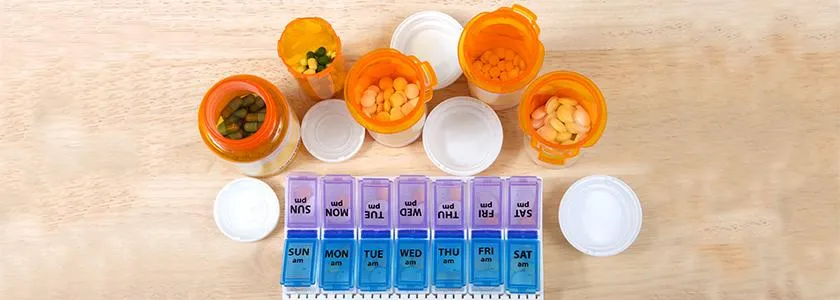Blogs

Medication Safety
This week on MedHeads
Maintaining medication safety at home can be daunting as the prescriptions increase.
Medication errors at home can be fatal or leave you in harm's way.
As complex health conditions can come with increased medications and specific times that they are required or other medications that cannot be taken at the same time, there can be increased stress and fear.
Reminders:
If you are tech savvy, there are apps that can assist in reminding to take medications with notifications. One such app is the Medadvisor app. It links to your local pharmacy, and you can upload prescriptions. Medications can also be delivered. Carer mode is also available – You can manage medications and prescriptions for kids, elderly, and other family members under one Medadvisor account. This is a free app but must be approved by your pharmacist. However, a lot of people either are not tech savvy or don't want to rely on a reminder, this also may not be appropriate if you have many medications.
Dosette box:
A dosette box is an option for someone who has a few prescriptions. It may also be known to some as the Monday –Sunday pill box. These can be very beneficial for many reasons including travelling. However, the down side is that they also require the unpacking of medications form bottles, an awareness of each pill and an awareness of the time that the pill needs to be taken. Dosette boxes usually don't facilitate medication dispensing at different times of day, but rather, act as reminders for daily dispensing.
Cost and accessibility: 5-10 dollars
Webster packs:
Webster packs are a useful option for clients who are prescribed multiple medications that need to be dispensed at multiple and specific times during the day. Webster packs are great for those managing complex regimes and can also relieve carer strain/stress and increase peace of mind for all involved in a person's life.
Webster packs come in a range of options such as the vision impaired version, multilingual version, and the Parkinson's disease specific version. They can be hung on the fridge and even have photo ID picture placed on the pack.
The generic webster pack has symbols for the time of day and the day of week across and down the side of the pack, the user just sees the time and date needed and pops the medications out of the blister.
Cost and accessibility: 5 dollars per week for pensioners, pending on pharmacy.
Sachet roll: dose aid :
Sachets- up to 5 medications in a pack
DoseAid's range of medication management solutions are designed to increase medication compliance and reduce the frequency of adverse incidents.
DoseAid's medicine sachets are a safe and effective way for people to keep track of their daily medicines. To complement its sachets, DoseAid has also partnered with Medido to make a one-of-a-kind compliance device available in Australia.
The medicines are sorted by day, dose, and time into individually labelled sachets with easy tear packaging in chronological date and time order. These sachets are then rolled up.
Each individual sachet can hold up to five different tablets. So, for example, if someone takes seven different tablets in the morning, their morning tablets will be divided between two sachets.
Every sachet is clearly labelled with:
•The patient's name
•The date and day of the week
•The dose time
•Names and physical descriptions (shape, colour) of the medicines
•The quantity of each tablet.
This information can be easily adapted depending on the specific needs of the individual.
Cost and accessibility: similar to Webster packs under PBS
Where to get help
•Your doctor
•Pharmacist
•NPS Medicines Line call 1300 633 424
•Adverse Medicines Events Line call 1300 134 237
Taking your medication safely
•Your doctor will monitor your prescription medication, but you need to make sure you follow your medication instructions, including:
•Take all medication exactly as instructed by your doctor or pharmacist.
•Do not take medication prescribed for someone else.
•Learn about your medication and know the importance of taking your medicine correctly. Ask your pharmacist for a Consumer Medicine Information (CMI) leaflet, which answers common questions about your medication (or look for it online as many drug companies publish them on the web).
•When buying over-the-counter medication, ask your pharmacist about side effects and interactions with other medication (including vitamins and herbal supplements) you are taking.
•If you are not confident that you will remember the instructions for taking the medication (such as dosage and time of day), write them down, or ask your doctor or pharmacist to write them down.
•If you are taking multiple medications or find you are forgetting if you have taken a dose, talk to your pharmacist about dosage aids (as described above)
•Ask your doctor if making changes to your lifestyle (such as diet and exercise) could reduce your need for medication.
•Ask your doctor if you may benefit from a Home Medicines Review. This is where a pharmacist reviews all the medication you take, and it can be done annually. You may be able to stop taking medication you no longer need.
•Throw out unwanted and out-of-date medication, as the active ingredient may no longer be effective. You can also return it to your pharmacy for safe disposal.
•Do not stop taking a prescribed medication without discussing it with your doctor. If it is not working for you, speak with your doctor about an alternative.
Watch this weeks show on MedHeads

